Australian Protests Son’s Guantanamo Detention
The father vocalized anger that Australia, which is a U.S. ally in the Afghanistan and Iraq wars, had done nothing to pressure Washington to return his son to stand trial in his own country.
"It’s frustrating when it comes to government, you’re banging your head against a brick wall, no one wants to talk to us," Hicks told the Australian Associated Press.
"This could be going on for another five years."
The father underlined that the Howard government had effectively washed its hands of his son.
"He is an Australian citizen. The government is very quick off the mark to give the drug dealers and everyone else to have consular access and lawyers, but when it comes to David’s situation, he has nothing. The Australian government aren’t strong enough to push their point."
Lawyer Stephen Kenny accused the government of ignoring Hicks’ basic human rights.
"The government have not even asked for David to be returned to Australia and that is a great disappointment considering the man has never been charged with any offence," he stressed.
Premier Howard avoided the protest outside a Liberal Party convention by slipping in through a side door.
A second Australia, Mamdouh Habib, is also being held at Camp X-Ray.
About 650 men from some 40 different countries are being held without trial at the U.S. naval base in Guantanamo Bay over charges of links with the al-Qaeda and Taliban.
Washington classifies the prisoners as "enemy combatants", effectively denying them the protection of the Geneva Conventions on the rights of prisoners of war.
Furthermore, the uncertain status makes it possible to hold them indefinitely without trial.
Pictures of the detainees blindfolded and in chains while being held in X-Rays open cages shocked the entire world.
The U.S.-based Human Rights Watch had frequently called on the Bush administration to investigate and address charges of torture of those detainees or risk criminal prosecution.
Major General Geoffrey Miller, who took over in November 2002 the command of the so-called Camp X-Ray where the 660 detainees are held, said in a recent interview that he would offer more rewards for cooperative behavior, such as chances to pray together rather than being held in high-security isolation cells.

